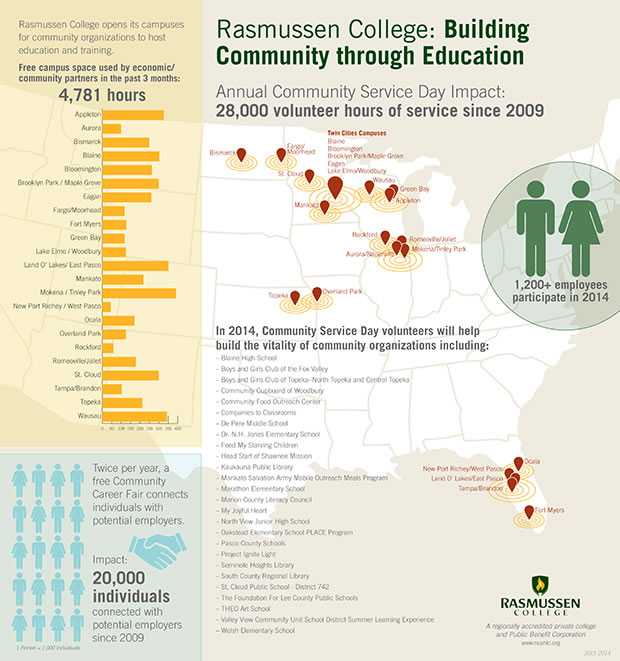Adopting a Public Benefit Corporation Status (PBC) is helping communities and recruitment & retention
 Colleges and universities often say they help students develop the skills needed for an enriched life and provide services that benefit the community; but a recent trend in adopting a formal status for higher education institutions is not only helping with regional accreditation and state standings, it’s helping recruit and retain millennial students and innovative staff.
Colleges and universities often say they help students develop the skills needed for an enriched life and provide services that benefit the community; but a recent trend in adopting a formal status for higher education institutions is not only helping with regional accreditation and state standings, it’s helping recruit and retain millennial students and innovative staff.
It’s called a Public Benefit Corporation (PBC) status, and it’s a status being mulled by The Higher Learning Commission—an independent corporation and one of two commission members of the North Central Association of Colleges and Schools (NCA) that accredits, and thereby grants membership in the Commission and in the North Central Association, degree-granting postsecondary educational institutions in the North Central Region—for colleges in the region.
Not only could adopting the PBC mean better accreditation standards for institutions, but it also helps institutions currently mired in a tough economy stand out among peers, mainly due to the status’ ability to formalize a plan to better support the regional community, allow campus faculty and admin to volunteer for paid community service hours, give students the skills pathways necessary to find a career post-graduation, and help students land internships and jobs with local businesses.
And though colleges and institutions won’t receive any funding or tax benefits, the PBC status can provide clarity and receive support from boards of directors, help create inter-departmental collaboration, help maintain and enhance institutional mission, and create stand-out marketing opportunities.
One of the leaders in adopting this PBC status, specifically under the “Building Community Through Education” platform, is Rasmussen College—partly because they’re one of the first institution’s to adopt the status.
(Next page: How Rasmussen uses PBC to bolster its community, student, faculty and business standing)
According to Tamryn Hennessy, vice president of career services and public benefit initiatives, Rasmussen began working toward a PBC status in 2013, in part to expand the College’s commitment to serve communities and students through career-focused education and volunteer efforts.
“Giving back to the communities the College serves has always been core to our mission,” explained Hennessy. “Becoming a PBC allowed us to take that commitment to the next level by formalizing it and putting a clear and measurable plan in place.”
Along with the HLC, Rasmussen understood that adopting the PBC status would have multiple benefits:
1. Recruiting students: Hennessy noted that according to an Ivey Business Journal study, 70 percent of Millennials say that giving back and being civically engaged are their highest priorities. The new PBC status gives students more opportunities to give back to the community through service opportunities, and students are encouraged to join the new National Community Service Student Organization developed thanks to the status.
2. Retaining students: Rasmussen, through its community services and enhanced partnerships with local and regional businesses, will provide students with even more opportunities to follow skills pathways toward their degrees, provide degrees necessary to enter the workforce immediately, and allow students to find local and regional internships and jobs within the community.
3. Recruiting and retaining campus faculty and staff: Hennessy explained that recent research also shows that corporate responsibility programs and the opportunity to give back is cited as the “third most important driver in employee satisfaction,” and the PBC status allows staff to participate in the annual Community Service Day drive, as well as increased opportunities to volunteer at nonprofit organizations during the workday for up to eight paid hours a week.
4. Better campus collaboration and communication: If there’s one hot-button issue making the think-tank and college president rounds of late, it’s the discussion around better inter-departmental communication and collaboration, and the PBC status is helping Rasmussen develop these networks through a cross-departmental task force that plans and leads all PBC initiatives.
5. Better relationships with local and regional businesses and boards: According to Hennessy, the PBC status will foster a better relationship with state and federal regulators because it offers a “formal, legal basis to make decisions that help our community prosper,” as well as enabling more support from the Board of Directors. The status also helps the community by offering free meeting spaces for organizations, opening career opportunities, hosting free community career fairs, bringing workforce training to nonprofits, and helping the community complete projects faster through staff volunteering. “At one Twin Cities area organization, Rasmussen College volunteers were able to complete a six-week project in just a few hours,” said Hennessy.
Because of these potential benefits, Rasmussen developed a full Communications and HR plan for the PBC work prior to adoption, and identified leadership across the College to be a part of the PBC task force.
(Next page: Year-one initiatives; infographic)
Rasmussen officially announced the new designation in January 2014 and the task force was formalized, as well as charged with defining internal faculty and staff initiatives under the PBC status.
“Our communications and HR departments developed a training platform,” explained Hennessy. “This was rolled out in January 2014 to explain to faculty, staff and our community partners what a public Benefit Corporation is and why this designation made sense for Rasmussen College as it was a natural evolution of our mission. The task force identified a PBC platform and a set of year-one initiatives, which were approved by the board and then adopted in July 2014.”
Year-one initiatives of the new PBC status include:
- Hosting National and local summits to advance career readiness competency.
- Offering free meeting space to community organizations for education/training.
- Partnering with businesses to identify challenges, needs and skill gaps in the workforce and releasing findings through white papers and presentations.
- Hosting free bi-annual career fairs for community members, students and alumni.
- Providing workforce preparedness training and opening Rasmussen College’s Virtual Career Center to select local organizations.
- Adopting a National Community Service Student Organization and opening participation to Rasmussen College students.
- Enhancing employee benefits by adding up to eight hours of paid time during the work day to volunteer at nonprofits that support our platform.
- Expanding Rasmussen College’s Community Service Day in all communities where the College has campuses.
At the end of each year, including the end of 2014, Rasmussen will issue a PBC report outlining the initiatives, implementation, and results of the work toward public good.
“When I get out in the business world, it’s also going to be important to me that I work for a company that is equally as responsible,” said one Rasmussen student, “and I think that…feeling good about life and helping others are good starts…and that’s why Rasmussen has really exceeded my expectations in a college.”
Below is an infographic created by Rasmussen that Hennessy says demonstrates “the reach of these key activities including Community Service Day,” which the College completed on July 18 and the free Community Career Fair, which Rasmussen holds twice a year. The first was in February 2014 and the College has another planned for September.
- 25 education trends for 2018 - January 1, 2018
- IT #1: 6 essential technologies on the higher ed horizon - December 27, 2017
- #3: 3 big ways today’s college students are different from just a decade ago - December 27, 2017


